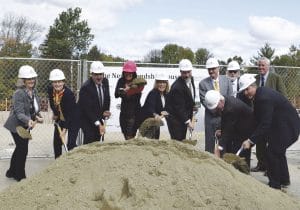
From left: North Country Health Consortium CEO Nancy Frank (left) leads Sen. Jeanne Shaheen (D-N.H.), District 1 Executive Councilor Joe Kenney (R-Wakefield), former Friendship House Director Kristy Letendre and Sen. Maggie Hassan (D-N.H.) and other stakeholders in a ceremonial groundbreaking ceremony on Friday at the brand-new Friendship House in Bethlehem. (EDITH TUCKER PHOTO) Conway Daily Sun
BETHLEHEM — Collaboration, perseverance, and optimism were cited as key factors leading to the ceremonial groundbreaking Friday of a new 32-bed $5.4 million Friendship House treatment and recovery center on Route 302.
Nancy Frank, CEO of the non-profit North Country Health Consortium, welcomed a crowd that included U.S. Sens. Jeanne Shaheen and Maggie Hassan. “Our communities have recognized that it is time to treat addiction as a chronic disease with a medical model,” she said.
“It’s a very exciting day,” said Mike Claflin, executive director of the nonprofit Affordable Housing Education & Development agency.
The foundation has already been poured for the 17,588-square-foot center, which will offer a continuum of care to those battling drug and/or alcohol addiction. “It took an array of public officials and public monies plus nonprofit partnerships, as well as a truly remarkable anonymous $2.5 million philanthropic gift,” Claflin said.
Public dollars included two $500,000 Community Development Block Grants and $100,000 from the Northern Regional Border Commission, plus funding from the N.H. Community Development Finance Authority and the N.H. Housing Finance Authority. Thanks to Commissioner Jeffrey Meyers, a $250,000 grant was also made by the state Department of Health and Human Services.
New Hampshire is ranked second to last for access to substance abuse treatment. Friendship House will go in October from being under the aegis of Tri-County CAP to the consortium. In preparation for this step, former Friendship House Director Kristy Letendre of Berlin has joined the consortium as continuum care facilitator.
Letendre, who started working at the facility nearly 15 years ago as an “awake night manager,” praised TCCAP’s alcohol and drug services team. “They’re the recovery warriors, the boots-on-the-ground.” She also praised those who come for treatment: “They admit their shortcomings and have the courage to ask for help.”
In May, former Director of Operations Nathan Morin of Berlin took on the role of acting director. Morin, who earned a B.S. in political science at Plymouth State, said he anticipates the new state-of-the-art facility will be ready for occupancy in October 2018.
The current facility accommodates 30 co-ed residents, up from 18 before the fire marshal granted code waivers.
TCCAP CEO Rob Boschen said his predecessor, Michael Coughlin, concluded the agency did not have the resources to manage Friendship House. Working with AHEAD and the Consortium has allowed the agency to work out the best solutions, he said.
Shaheen said these solutions are a testament to the “‘can-do” attitude of the North Country.
Hassan said efforts like building a new sustainable Friendship House serve to strengthen the state as it deals with a substance misuse crisis. Hassan said she is pleased the president has signed the first specific law she has sponsored: All doctors must understand that all opioids are addictive. She also thanked those who struggle with addiction and their families for having the courage to speak to her of their experiences.
Gov. Chris Sununu was represented by Marty Boldin, his policy adviser for prevention treatment and recovery. He and Doris Enman, North Country Serenity director, spoke on behalf of those in recovery as a way of life.
U.S. Rep. Annie Kuster was represented by Brian Bresnahan, who read aloud a letter from her. “Expanding access to treatment for substance use disorders in the North Country is critical to helping address the opioid epidemic, which is having such a devastating impact on communities in northern New Hampshire and the entire state,” she wrote.
District 1 Councilor Joe Kenney and District 1 state Sen. Jeff Woodburn both said they are extremely pleased to see a treatment and recovery center located in northern New Hampshire.
Woodburn led a moment of silence for those who died before adequate treatment services were available. “This is a minimum; we need to do more,” he said. “It is for those we have lost.”

